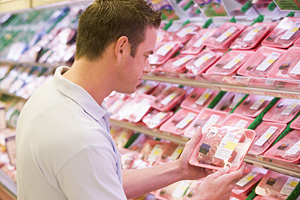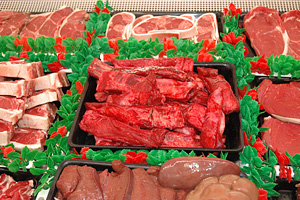Shopping for Animal Welfare
Published on 1 February 2013 in Food, health and wellbeing

Many people are concerned about animal welfare and are keen to buy animal friendly products. SRUC research found that various factors have a significant influence on shoppers’ buying choices, with access to welfare information and better labelling key to changing behaviour. Rising prices are also a possible barrier and without increasing the information available the growing number of ethically minded customers will not have enough knowledge to make animal friendly purchases.
Key Challenges
In the current economic crisis, rising food prices can affect how shoppers decide what to buy. Products that guarantee higher animal welfare standards – but are often more expensive – may be left on the shelf as the difference between what people say they will buy and what they actually purchase increases. However, as animal welfare is a growing concern for many consumers, and the European Union, this disparity between intentions and actions needed to be studied. People want to buy animal friendly products and policymakers need to understand how they can help them do so.
Key Benefits
SRUC researchers studied what affects consumers’ decisions to buy, or not buy, animal friendly food across Europe. Analysing data from over 8,000 people from nine countries the project found that various factors, such as level of education, occupation and number of children, can influence people’s buying habits. Most importantly however, the study concluded that better consumer awareness of animal welfare issues, clearly marked high welfare products and, indeed, better availability of such products should increase demand.
Such research is highly significant to those in government as providing the public with information on animal friendly products is one of the six actions of the EU Strategy for the Protection and Welfare of Animals 2012 – 2015.
Most importantly however, the study concluded that better consumer awareness of animal welfare issues, clearly marked high welfare products and, indeed, better availability of such products should increase demand.
The report states: “Consumers’ growing interest in how animals are treated on farms and in livestock facilities has created a strong demand for better information… Many individual EU countries have their own animal welfare information programmes. The European Commission plans to study these on going efforts and, if needed, will help to fill any information gaps.”
This research will directly impact the way industry and government informs, and responds to, the higher demand for welfare friendly products from a more ethically-minded public. As more people begin to expect such products the more animals will benefit from higher welfare requirements. Ultimately it is the growing awareness of welfare issues among the general public that drives improvements in animal care.


Comments or Questions
Related External Documents
Related Websites
Our Partners
Needs Our Partners
Find Out More
For more information visit Dr Luiza Toma's research profile, http://www.sruc.ac.uk/ltoma.Author
Dr Luiza Toma Luiza.Toma@sruc.ac.uk







